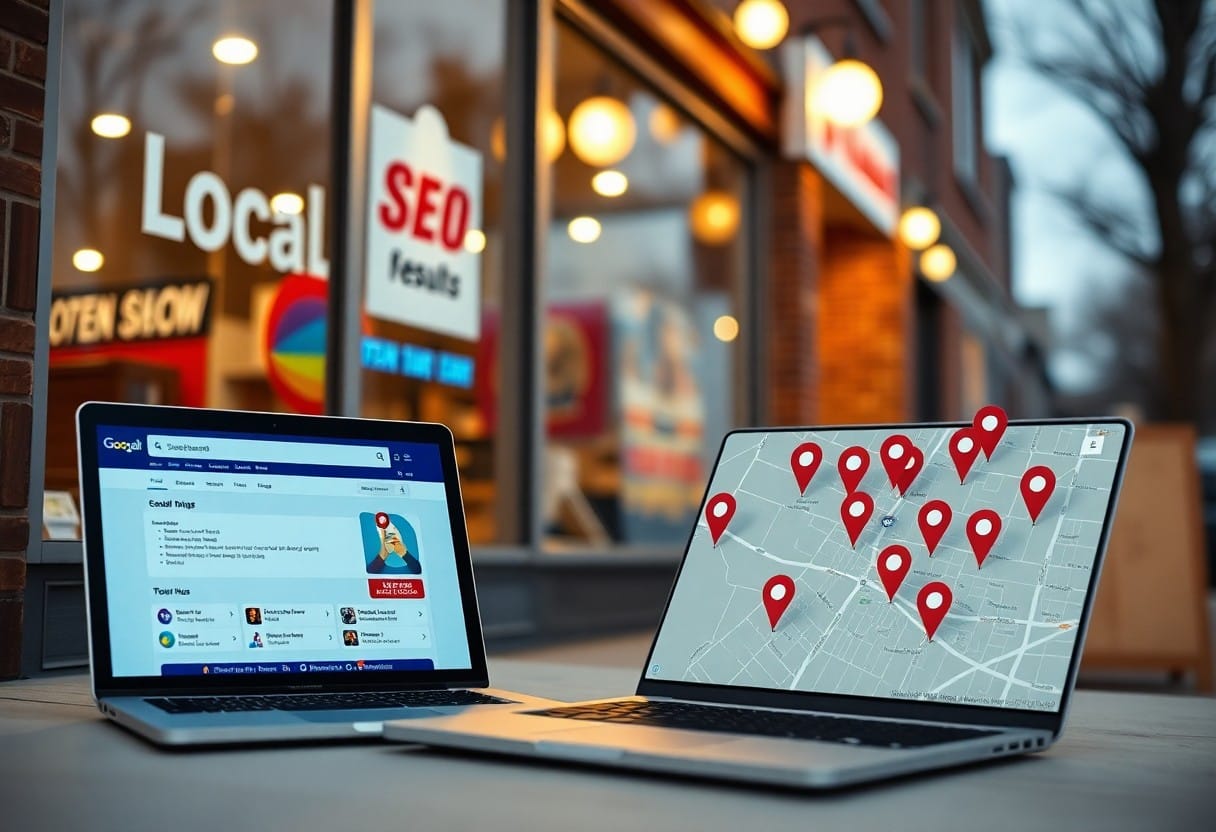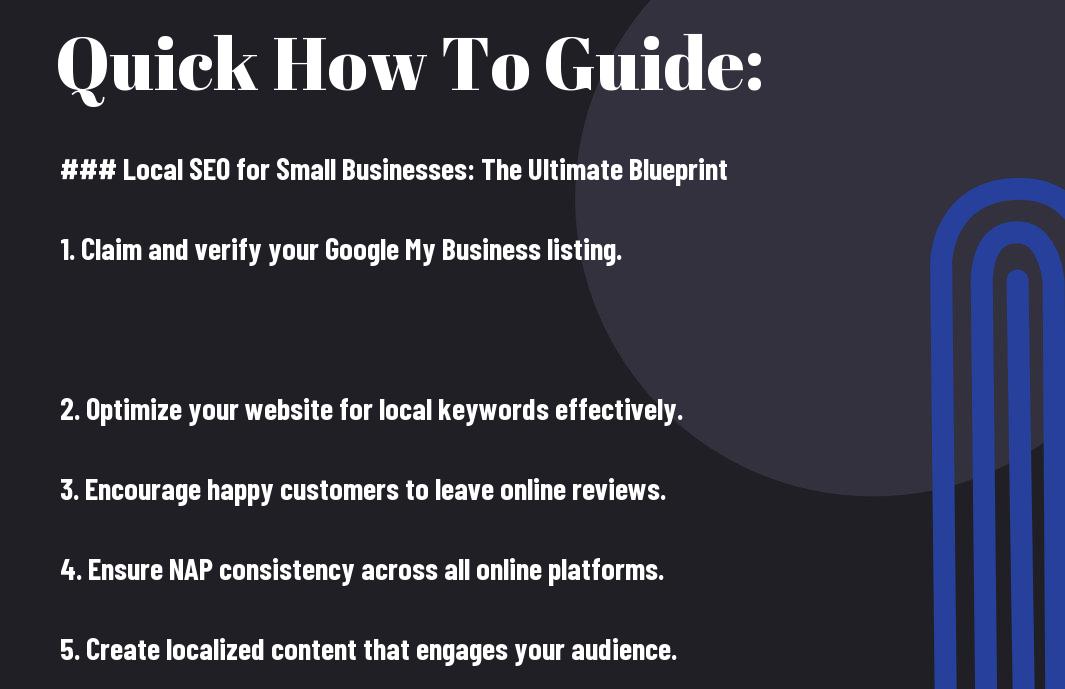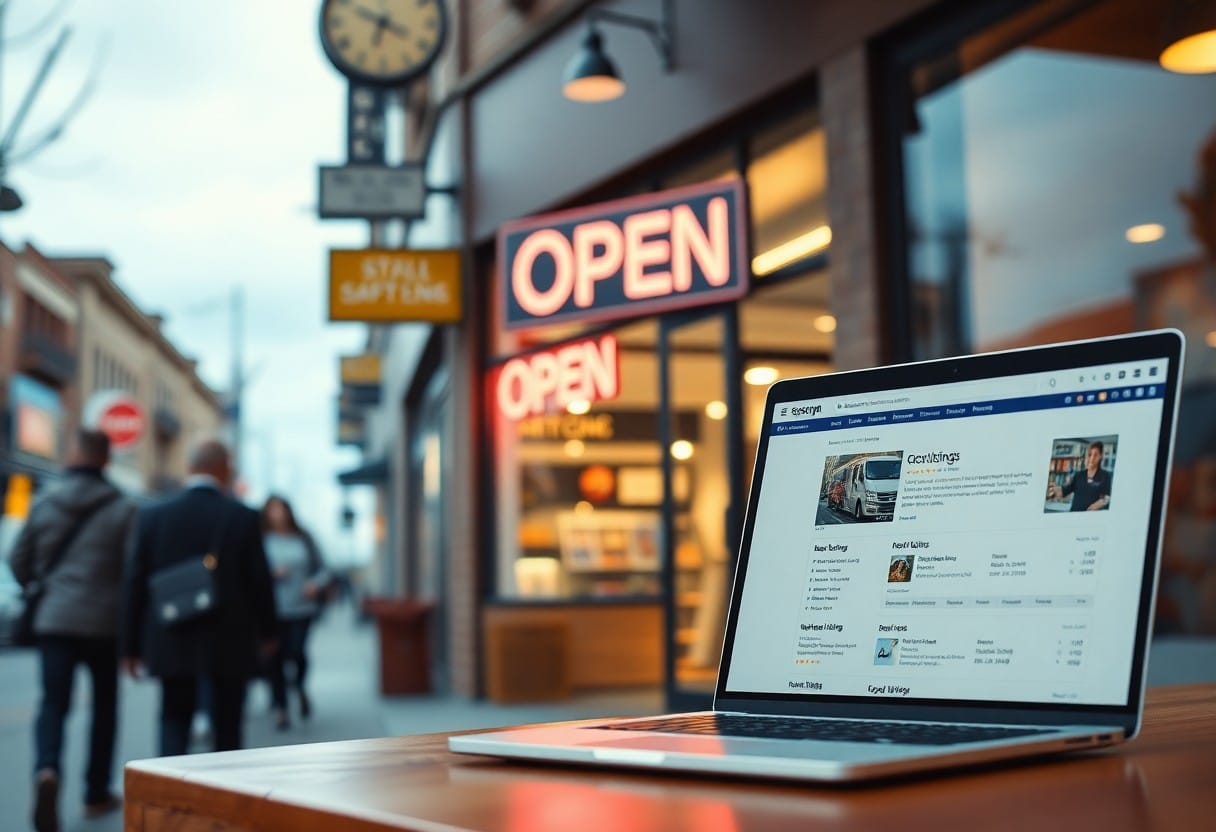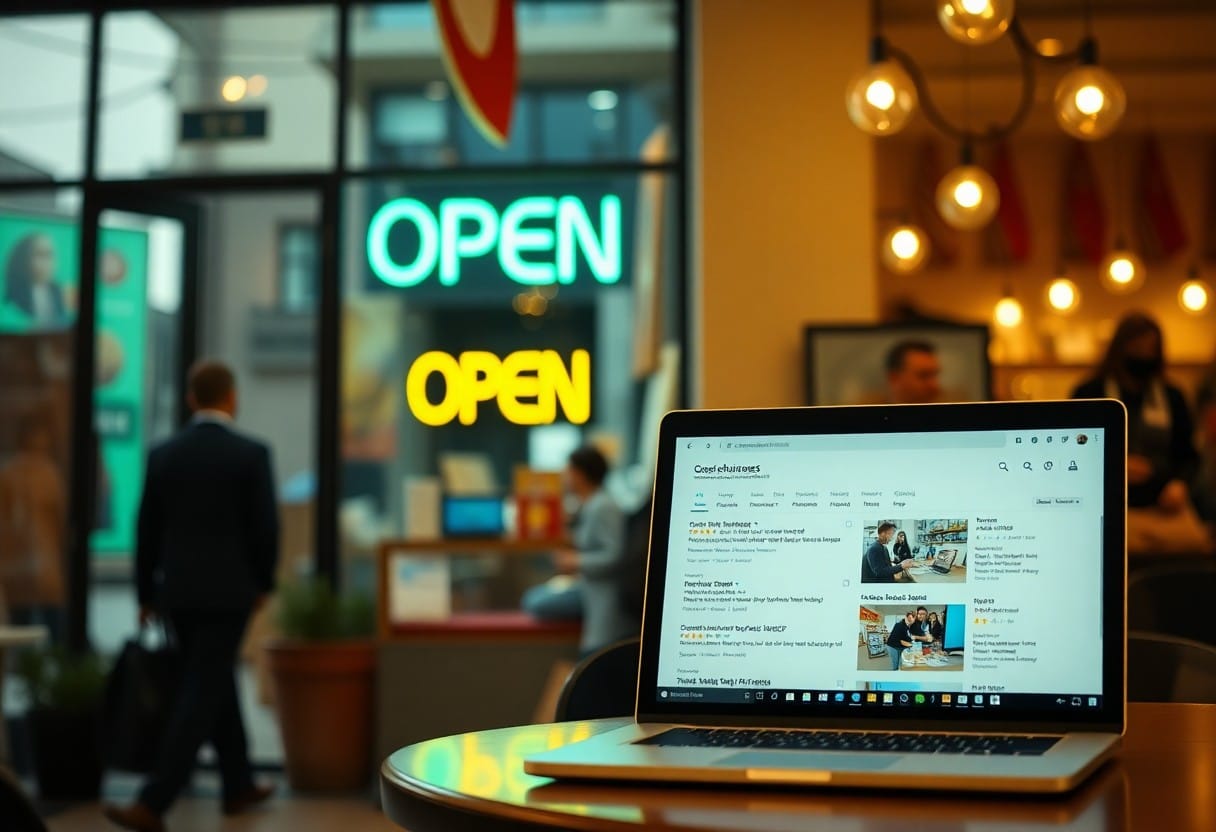There’s a powerful opportunity for you to enhance your visibility and attract more customers through Local SEO. This comprehensive guide will walk you through imperative strategies tailored for small businesses like yours, ensuring you stand out in local searches and connect with your community effectively. By implementing these actionable steps, you can improve your online presence, drive traffic, and increase sales. Let’s explore the ultimate blueprint to make your business thrive!

Key Takeaways:
- Optimize Your Google My Business Listing: Ensure your business is listed accurately with up-to-date information, including your address, phone number, and business hours. Encourage customer reviews to enhance your local visibility.
- Use Local Keywords: Incorporate location-based keywords in your website content, meta descriptions, and titles. This helps search engines understand your business’s relevance to local searches.
- Create Locally Relevant Content: Develop blog posts or articles that address topics specific to your community or region. This positions you as an authority and attracts local customers.
- Build Local Citations: Ensure your business is listed on local directories and websites. Consistent NAP (Name, Address, Phone) information across platforms helps improve your local search rankings.
- Engage with Your Community: Participate in local events, sponsor community activities, or collaborate with other local businesses. This not only increases brand visibility but also enhances your local SEO efforts.

Understanding Local SEO: A Foundation for Small Businesses
Before stepping into strategies, it’s important to grasp what local SEO truly entails. Local SEO focuses on optimizing your online presence to attract business from local searches on Google and other search engines. This form of search engine optimization helps your business be found by potential customers in your area who are actively seeking products or services like yours. A well-executed local SEO plan can not only enhance your visibility but also turn local searches into actual sales.
Defining Local SEO
Any small business aiming to enhance its online footprint must understand the key components of local SEO. This subset of SEO involves specific strategies designed to improve your rankings in local search results, which are tailored to your geographical area. When potential customers search for services or products that you offer, local SEO ensures that your business appears prominently in the search results, particularly in Google Maps and local pack listings.
Optimizing your website and online listings with your business name, address, phone number, and relevant local keywords will help in delivering high-quality traffic to your site. This optimization not only makes the search engines recognize your business as a local offering but also builds trust within your community.
Key Differences Between Local and Traditional SEO
Defining the distinctions between local and traditional SEO will help you understand where to focus your efforts. Traditional SEO tends to aim for broader searches without a geographical focus, targeting a larger audience across various locations. However, local SEO specifically hones in on local search intent, meaning people who are searching for products and services relevant to their immediate vicinity. This is where you can find your niche and stand out from the competition.
To put it simply, while traditional SEO strategies aim to improve your website’s visibility on a national or global level, local SEO adds a geographical component. This means that ranking for “best coffee shop” nationally is vastly different than ranking for “best coffee shop in [your city].” Understanding these differences can help you tailor your marketing strategy to meet the specific needs of your community.
The Importance of Local Rankings for Small Enterprises
There’s no denying that local rankings play a significant role for small enterprises. Approximately 46% of all Google searches are seeking local information, meaning that if your business doesn’t appear in local search results, you may miss out on potential customers who are specifically looking for services in your area. A strong local SEO presence allows you to tap into a market of users who are looking to connect with businesses like yours nearly in real-time.
Moreover, securing a high local ranking not only drives traffic but also enhances the credibility and reputation of your business. Reviews, local citations, and optimized web content are vital in establishing your authority in the local landscape. Without a solid approach to local SEO, your small business may struggle to attract nearby customers, hindering your overall growth potential.
Between focusing on local SEO strategies and enhancing your online presence, the potential for attracting new clients is immense. You want to be the go-to business when consumers in your locality are searching for relevant products or services. Don’t lose out on the opportunity to engage with local customers at the right moment—implement local SEO techniques and reap the benefits.
How to Conduct Local Keyword Research
You may be wondering how to effectively conduct local keyword research to boost your small business’s online visibility. In the world of Local SEO, choosing the right keywords is a foundational step in driving targeted traffic to your website. By tapping into the keywords that reflect local intent, you can connect with customers who are actively searching for services like yours in your area. In this chapter, we’ll share actionable strategies to help you discover these valuable keywords and optimize your content accordingly.
Tools for Effective Keyword Research
There’s a variety of tools at your disposal to streamline your keyword research process. Utilizing platforms like Google Keyword Planner, Ubersuggest, and SEMrush can help you uncover local search terms and phrases related to your business. These tools provide insights into search volume, competition, and even related keywords that you may not have initially considered.
Leveraging these tools allows you to filter results by geographic location, ensuring that you appeal specifically to your local audience. Incorporate variations of your primary keywords, such as “best pizza in [your city]” or “affordable plumbers in [your neighborhood],” to maximize your reach and improve your rankings in local search results.
Identifying Local Search Intent
Some keywords may look appealing based on their search volume, but understanding the local search intent behind them is equally important. Start by discerning whether your audience is looking for information, services, or products. This can help you tailor your content to better meet their needs and encourage conversions.
Research shows that local keywords often revolve around specific intents, such as “near me” searches or inquiries about services. By focusing on these intent-driven phrases, you can create content that directly addresses what your customers are looking for, guiding them more effectively to your business.
Analyzing Competitors for Keyword Opportunities
You can gain valuable insights into your local market by analyzing what keywords your competitors are targeting. Tools like Ahrefs and Moz allow you to input competitor URLs to discover which keywords are driving traffic to their sites. This tactic not only gives you a sense of the competition but also highlights gaps where you can differentiate yourself.
Look for keywords where your competitors have a strong presence and consider how you can create better quality content that meets your audience’s needs. By filling those gaps, you can position your business as a go-to resource within your community, ultimately driving more traffic and potential sales.
Competitors often expose opportunities that you can capitalize on. Understanding their strengths and weaknesses can provide a roadmap for your own keyword strategies, allowing you to refine your approach and not just match but exceed what’s currently available in the market. Start leveraging this competitive analysis to gain an edge in your local SEO efforts.
How to Optimize Your Website for Local SEO
Despite the competitive landscape of local search, optimizing your website for local SEO can set your small business apart from the rest. By employing effective strategies, you can enhance your visibility in local search results, attract more customers, and ultimately increase your revenue. Start by focusing on on-page SEO techniques that target both search engines and your audience, ensuring that your website is not only discoverable but also engaging.
On-Page SEO Techniques
An imperative aspect of on-page SEO involves optimizing your content with relevant local keywords. These are terms and phrases that potential customers are likely to use when searching for services or products in your area. For example, if you run a coffee shop in Boston, integrating keywords such as “best coffee in Boston” or “Boston coffee shop near me” into your page titles, headings, and throughout your content can significantly enhance your local search visibility. Additionally, ensure that each page includes your business’s name, address, and phone number (NAP) consistently to reinforce your local presence.
An effective local SEO strategy also incorporates meta tags and descriptions, local schema markup, and internal linking to related pages. These elements not only provide vital information to search engines but also help users navigate your site smoothly. Furthermore, including location-specific images and alt texts can enhance your local relevance, making it easier for search engines to associate your business with your geographical area.
Technical SEO Considerations
With the right technical SEO considerations in place, you can significantly improve your mobile responsiveness, site speed, and overall user experience. Search engines prioritize websites that load quickly and are optimized for mobile devices, imperative factors since many local searches occur on smartphones. Tools like Google PageSpeed Insights can help you identify areas for improvement, ensuring that your website performs well across all devices, thus keeping potential customers engaged.
Understanding the importance of secure website protocols (like HTTPS) and ensuring your site is easily crawlable by search engines are also key technical aspects to consider. Implementing a robust sitemap and leveraging robots.txt files can help search engines index your site more effectively. Additionally, optimizing for local voice searches by including conversational keywords and phrases can provide you an edge in capturing the growing audience using voice-activated devices.
By taking the time to implement these technical SEO considerations, you not only enhance your website’s performance but also improve your chances of ranking higher in local search results. As you work on your local SEO strategy, remember that every small adjustment can contribute to your overall visibility and attract more customers to your business.
Google My Business: How to Leverage This Powerful Tool
Your presence on Google My Business (GMB) can significantly enhance your visibility and customer engagement. By optimizing your listing, you make it easier for potential clients to find you online. This not only boosts your local SEO efforts but also drives traffic to your website and physical location. Take advantage of GMB to remain competitive and reach those nearby who are seeking your products or services. If you’re looking to establish a robust online presence, it starts with claiming and managing your GMB listing effectively.
Claiming and Verifying Your Business Listing
Any business owner should prioritize claiming and verifying their Google My Business listing. This process ensures that you have full control over the information displayed about your business, including your address, phone number, and operating hours. Verification typically involves receiving a postcard from Google at your business address or, in some cases, phone or email verification. Once verified, you can update your information, respond to reviews, and monitor analytics to track your listing’s performance.
Additionally, claiming your listing boosts your credibility with potential customers. It shows that you are a legitimate business and helps you establish trust in your community. If you haven’t already completed this step, take action today and claim your GMB listing to open the door to new opportunities.
Selecting Appropriate Business Categories
For your Google My Business listing to perform optimally, it’s vital to select categories that accurately reflect your business. Selecting the right categories not only helps Google understand your services better but also connects you with the right audience. When potential clients search for specific services, you want to ensure that your business appears in relevant search results. Spend some time researching potential categories to ensure you maximize your visibility.
A well-chosen primary category can significantly enhance your ranking potential in local searches. It’s advisable to choose a category that is closely aligned with what your business offers. Secondary categories can further refine your listing and provide additional context, ensuring that you reach the relevant customer base you are targeting.
Enhancing Your Profile with Images and Updates
Updates and images play an important role in making your Google My Business profile stand out. Regularly posting updates about your services, promotions, or events keeps your audience engaged and informed. Additionally, high-quality images showcasing your products, services, or even your staff can create a positive first impression and entice potential customers to choose your business over others.
The more vibrant and dynamic your GMB profile appears, the more likely it is to attract customers. Aim to upload fresh images regularly and leverage the update feature to communicate with your audience. This proactive approach not only enhances your visibility but also builds a meaningful connection with your customers, driving them closer to using your services.
How to Build Local Citations and Listings
Keep in mind that building local citations and listings is vital for boosting your small business’s visibility in local search results. By ensuring your business appears in local directories, you can enhance your online presence, making it easier for potential customers to find you. This process involves identifying relevant local directories that cater to your specific industry and geographical location.
Identifying Relevant Local Directories
Little effort spent on identifying the right local directories can yield significant returns. Start by focusing on local business listing platforms that resonate with your target audience. Websites like Yelp, Google My Business, and Bing Places are culturally ingrained in local searching behavior. Additionally, explore niche directories that cater to your specific industry; for example, if you run a restaurant, platforms like Zomato or TripAdvisor can be invaluable.
The Importance of NAP Consistency Across Citations
Even minor discrepancies in your business’s Name, Address, and Phone number (NAP) across various listings can lead to a fragmented online presence. This inconsistency confuses search engines and, ultimately, your potential customers. Ensure that your NAP is identical on all platforms to improve your local search rankings and establish trust with your audience.
Build a strong foundation by regularly auditing your listings to confirm that your NAP information remains consistent. Inconsistent NAP data can not only harm your visibility but also lead to losing potential clients who may turn to competitors with more reliable information. Consistency is vital; failing to maintain it can result in lower rankings and missed opportunities.
Tracking and Managing Your Listings
Listings are not a one-and-done process; you must actively manage and track your local citations. Use online tools like Moz Local, Yext, or BrightLocal to monitor your citations consistently. These platforms help ensure that your business information is accurate, up-to-date, and widely distributed across various directories. If any discrepancies arise, you can address them immediately to maintain your brand’s credibility online.
Importance lies in maintaining an organized approach to your citations. Regularly check your listings not only for accuracy but also for new opportunities to enhance your local SEO strategy. By continually adapting your local listings, you position yourself favorably against competitors who may neglect this vital aspect of their marketing efforts.

Local Link Building: Strategies for Success
Now that you understand the importance of local SEO, it’s time to explore into effective local link building strategies that can boost your small business’s online visibility. By acquiring links from reputable local sources, you not only improve your search rankings but also enhance your credibility in the eyes of potential customers. Below, we explore several strategies you can implement to get started with local link building today.
Networking with Local Influencers and Bloggers
While you may think that only large enterprises benefit from influencer marketing, the truth is that local influencers and bloggers can play a significant role in your SEO strategy. Engaging with these local figures can help you build quality backlinks while simultaneously expanding your reach within your community. Start by researching local influencers who align with your brand values and who have an engaged audience. Consider reaching out to them with a proposal for collaboration, such as a social media shout-out or a joint event.
In your outreach efforts, ensure that you highlight what makes your business unique and the mutual benefits of a potential partnership. By creating connections with local bloggers and influencers, you tap into their established platforms and foster authentic relationships that can lead to valuable backlinks and even increased brand awareness.
Contributing to Local Events and Charities
Strategies for link building can also include getting involved in local events and charities, which creates an opportunity for you to showcase your business while earning backlinks from credible organizations. Sponsoring events, participating in fundraisers, or donating your services can result in backlinks from local media coverage, event sites, and charity websites. These links not only enhance your SEO but also positively associate your brand with good community practices.
Building ties with local charities and events not only helps you gain backlinks but also establishes your brand as a community-oriented business. When you align yourself with causes that resonate with your audience, you’re promoting a positive image while inviting potential customers to engage with your brand. Don’t underestimate the power of community involvement; these actions lead to lasting relationships and can significantly influence your online presence.
Guest Blogging for Local Websites
Contributing to local websites through guest blogging is another effective strategy for building strong local links. By writing informative and engaging content for local blogs, you not only share your expertise with a new audience but also earn quality backlinks to your site. Target local blogs and news outlets that are relevant to your industry or niche; this ensures that the audience you reach is likely to be interested in your products or services.
Charities and nonprofit organizations often welcome guest posts from local businesses, especially if your content provides value to their audience. By crafting high-quality articles that address local issues or offer insights related to your business, you can position yourself as a thought leader while simultaneously enhancing your link profile. Always ensure that your guest posts include links to your website, guiding readers to take the next step in exploring your offerings.
Customer Reviews: Boosting Your Local SEO Efforts
For small businesses, customer reviews can be a game changer when it comes to enhancing local SEO efforts. In today’s digital landscape, potential customers heavily rely on reviews and ratings to make informed purchasing decisions. According to recent studies, nearly 84% of consumers trust online reviews as much as personal recommendations. This reliance on social proof means that having a solid collection of favorable reviews can significantly impact your business’s visibility in local search results.
The Role of Reviews in Local Rankings
To optimize your local search rankings, understanding the role of customer reviews is crucial. Search engines, particularly Google, prioritize businesses with a high volume of positive customer feedback, as this indicates trustworthiness and relevance. When customers leave reviews on your Google My Business profile, it not only boosts your ranking but also provides valuable content that can enhance your local presence. In fact, businesses with more than seventy reviews on Google are 23 times more likely to attract customers.
Strategies for Generating Positive Reviews
If you want to successfully generate positive reviews, create a structured plan that encourages satisfied customers to share their experiences. Start by identifying happy clients and reaching out to them shortly after they’ve engaged with your business. This proactive approach can significantly increase the likelihood of receiving glowing reviews. Additionally, you can incorporate feedback requests into follow-up emails or thank-you notes, providing customers with a smooth way to leave reviews online.
Reviews should be actively managed and highlighted on your website and social media platforms to drive engagement and encourage more customer interactions. Use incentives like discounts or entry into a giveaway to motivate your clients to share their positive experiences. Offering multiple platforms for feedback can also aid proliferation; customers might prefer posting on Google, Yelp, or Facebook based on their comfort levels, so ensure you provide options.
Best Practices for Responding to Customer Feedback
Customer interaction doesn’t end once a review is posted. You must engage with your reviewers, whether their feedback is positive or critical. Acknowledging positive reviews not only bolsters your relationship with those customers but also showcases your excellent customer service to potential clients browsing through your ratings. Responding to negative reviews, on the other hand, presents an opportunity to demonstrate your commitment to customer satisfaction and improve your public image.
The key to successful responses is to remain professional, polite, and prompt in your replies. Even if a review is critical, a thoughtful response can help mitigate concerns and show other customers that you care about their experiences. Additionally, consistently responding to feedback can lead to a 10% increase in customer testimonials, validating your efforts in cultivating a strong online presence.
How to Utilize Social Media for Local SEO
Once again, leveraging social media effectively can significantly enhance your local SEO efforts. Social media platforms such as Facebook, Instagram, and Twitter offer powerful opportunities for engagement, brand awareness, and local outreach. By actively participating in these channels, you can establish a connection with your local audience and drive traffic to your website. Incorporating local hashtags and geotagging your posts can also help you reach potential customers in your area. For a deeper probe local SEO strategies, check out 2024 Local SEO Blueprint: The Ultimate Guide to Boosting ….
Engaging with Local Audiences
Clearly, engaging with local audiences on social media is about more than just posting content—it’s about interaction. Responding to comments, sharing user-generated content, and participating in local conversations can build trust and community around your brand. Be sure to share local events, news, and partnerships that resonate with your audience. By fostering this sense of community, you’re more likely to see increased brand loyalty and local traffic to your site.
Moreover, consider creating content specific to local interests—such as highlights on local businesses, attractions, or cultures. This aligns your brand with local relevance, making it easier for potential customers to associate your products or services with their community. Effective engagement can lead to strong relationships, which often translate into sales.
Promoting Your Google My Business Profile
An effective way to boost your local SEO is by optimizing and promoting your Google My Business (GMB) profile. Your GMB listing can significantly influence how customers find you when searching for local services. Make sure your profile is complete with correct business hours, contact information, and photos that showcase your offerings. Encourage happy customers to leave positive reviews, as this not only enhances your credibility but also boosts your rankings on local search results.
Promoting your Google My Business profile can involve sharing your GMB link on social media, embedding it in your website, or including it in email signatures. Regularly update your profile with photos and posts highlighting special promotions or events, as active engagement can improve your visibility in local search results.
Leveraging Local-Focused Advertising
Advertising in local markets can offer direct traffic and conversions. Platforms like Facebook and Instagram allow you to create targeted ads that focus on specific demographics, locations, and interests. By setting up campaigns tailored to your local audience, you can drive engagement and attract potential customers who are already interested in your offerings. Additionally, you may find that local deals and promotions resonate well with your audience, prompting immediate action.
Leveraging local-focused advertising can significantly enhance your visibility among users who are more likely to convert. Use engaging visuals and compelling offers within your ads to capture attention quickly. Tracking your ad performance through analytics can provide insight into what resonates most with your audience, allowing you to refine your strategies over time.
By strategically implementing these social media tactics and integrating them with your overall local SEO strategy, you position your business to attract more local customers. As you continue to grow your social presence, you’ll find that engaging authentically with your local audience can yield significant benefits for your business.

Analyzing Local SEO Performance
Not only do you need to implement effective local SEO strategies, but you also need to actively monitor your performance. Understanding how well your efforts are translating into tangible results is key to driving growth for your small business. By analyzing your local SEO performance, you can identify what’s working and what isn’t, allowing you to refine your tactics. For a deeper probe proven strategies, check out Furniture Store Local SEO Strategies for Growth | MicroD.
Key Metrics to Track
If you want to improve your local SEO performance, it’s necessary to track specific metrics that reflect your progress. Focus on local keyword rankings, organic traffic, click-through rates (CTR), and conversion rates. These vital indicators will help you gauge how well your website is performing in local search results. For example, an increase in local keyword rankings could lead to higher visibility in your area, ultimately driving more visitors to your business.
In addition to standard analytics, keeping an eye on your Google My Business (GMB) insights is another way to monitor performance. You should pay attention to how many people are finding your listing through searches and what actions they are taking afterward, such as requesting directions or calling your business. This information provides valuable insights into how effectively potential customers are engaging with your online presence.
Tools for Monitoring Your Performance
An effective local SEO analysis requires the right set of tools. Platforms such as Google Analytics, Google Search Console, and various local SEO tools like Moz or SEMrush can provide you with in-depth insights into your website’s performance. Monitoring tools can help you track local rankings, assess backlinks, and analyze your competitors’ strategies. By utilizing these tools, you can gather data that informs your SEO efforts and highlights areas for improvement.
Understanding what these tools reveal about your performance is just as necessary as the data itself. Leverage them to identify trends, spikes, and declines in your traffic. This knowledge allows you to make informed decisions about where to allocate your resources and how to adjust your local SEO strategies. Analytics play an important role in guiding your future actions.
Adjusting Your Strategy Based on Analytics
With the insights gained from analyzing your local SEO performance, it’s time to pivot and adjust your strategy accordingly. If you notice specific keywords underperforming, consider revisiting those pages and enhancing their content with more relevant information or optimizing on-page elements. Doing so can give your content a better chance of ranking higher in local search results.
Furthermore, if your GMB metrics show low engagement, it may indicate the need to enhance your listing, perhaps by adding more images, responding to reviews, or regularly posting updates. This kind of proactive adjustment can make a significant difference in how your local audience perceives your business.
Track everything you analyze, from keyword effectiveness to user interaction metrics. Assessing past performance allows you to make data-driven decisions to refine your local SEO strategy continuously. This approach ensures that your efforts yield maximum visibility and engagement in your target market.
How to Stay Updated with Local SEO Trends
To effectively navigate the rapidly evolving landscape of local SEO, staying informed about the latest trends and updates is crucial for your small business. This continuous learning not only enhances your SEO strategies but also ensures that you remain competitive. Utilizing various resources can help you stay on top of local SEO developments and adapt your tactics accordingly. Here are some strategies to keep you updated.
Following Industry Blogs and Publications
To broaden your knowledge of local SEO, make it a habit to follow reputable industry blogs and publications. Sources like Moz, Search Engine Journal, and Ahrefs provide insights into algorithm changes, best practices, and case studies that can inform your marketing strategies. Subscribing to newsletters from these platforms can fill your inbox with valuable information, ensuring you’re never left behind on the latest updates that could impact your business’s online visibility.
Additionally, consider joining platforms like Medium, where many professionals share their expertise and thoughts on current trends. Engaging with these articles through comments and social shares can help you connect with like-minded individuals and gain new perspectives on implementing local SEO strategies for your business.
Participating in Local SEO Forums and Groups
Local SEO forums and online groups can be a wealth of information and networking opportunities for small business owners like you. These communities provide a platform to discuss current challenges, share experiences, and ask for advice on local SEO strategies. Being an active participant allows you not only to learn from others but also to contribute your knowledge, thus enhancing your visibility in the community.
Trends in local SEO are continuously shifting, thanks to algorithm updates and consumer behavior changes. By joining forums such as the Local Search Forum or groups on social media platforms like Facebook and LinkedIn, you can gain insights into what local strategies are working for others in your niche. This kind of engagement is vital for not only learning new techniques but also for building your professional network.
Attending Workshops or Webinars
Little knowledge goes a long way, particularly when it comes to attending workshops or webinars that focus on local SEO. These events often feature industry experts who share their most up-to-date insights, tips, and strategies. By participating in these sessions, you gain firsthand knowledge that can help you refine your approach to local SEO. Furthermore, you have the opportunity to ask questions and interact with professionals who can provide tailored advice relevant to your business.
The value of attending workshops and webinars extends beyond just learning; they also offer networking opportunities with other local business owners and marketers. Engaging with peers can lead to partnerships and sharing of resources that could bolster your local SEO efforts. Make it a priority to look for ongoing training sessions to keep your SEO strategies fresh and effective.
Incorporating these methods into your routine will ensure that you stay on the cutting edge of local SEO trends, making your small business more adaptable. Are you ready to take your local SEO to the next level? Contact our agency today to learn how we can help you implement these strategies effectively!
How to Identify and Avoid Common Local SEO Mistakes
Unlike many small business owners, who may feel overwhelmed by the complexities of local SEO, you can enhance your online presence by identifying and steering clear of frequent pitfalls. By avoiding these mistakes, you will not only boost your rankings on search engines but also build a more trustworthy connection with your local audience. In this section, we will explore some key errors that can hinder your local SEO efforts and offer practical solutions to help your business shine in local searches.
Overlooking Mobile Optimization
Clearly, in today’s digital age, an increasing number of consumers are using mobile devices to search for local services. If your website is not optimized for mobile, you risk losing potential customers who may abandon your site due to poor user experience. Remember that a significant portion of local searches are performed on smartphones, and Google takes mobile-friendliness into account when ranking sites. Ensure that your website is responsive and loads quickly across all devices to cater to this growing segment of users.
In addition, prioritize features such as tap-to-call buttons and location services that enhance the mobile experience. By investing in mobile optimization, you position your business as accessible and user-friendly, thus increasing the chances of drawing in new clients eager to engage with your services.
Ignoring Customer Reviews and Feedback
While it might be tempting to focus solely on technical SEO aspects, overlooking customer reviews can severely impact your local SEO efforts. Customer feedback not only affects how potential clients perceive your brand but also plays a significant role in local search rankings. Google values businesses with positive reviews, which can enhance your visibility in search results and attract more customers. Therefore, proactively managing your online reputation by seeking reviews should be a priority for your SEO strategy.
Plus, responding to reviews—both positive and negative—demonstrates that you value customer feedback, fostering trust and loyalty among your clientele. This engagement not only improves your brand’s online reputation but can also lead to more favorable search results, boosting your local visibility.
Failing to Keep Information Updated
Now, one of the most critical mistakes you can make in local SEO is neglecting to keep your business information up to date. Accurate details, such as your business hours, location, and contact information, ensure that potential customers can easily reach you. Inconsistent data across various platforms can confuse both users and search engines alike, leading to diminished trust and lower search rankings. Regularly check that your Google My Business listing and other local directories reflect the correct information to maintain your credibility.
Moreover, inconsistency in your information can lead to lost opportunities. By ensuring that your business details are up to date on all platforms, you not only enhance the chances of appearing in local results but also provide a seamless experience for potential customers looking for your services.
Understanding the significance of maintaining accurate business information can be a game changer for your local SEO strategy. Regular audits of your online presence will help you catch any discrepancies before they impact your business negatively, ultimately leading to more leads and satisfied customers.
Finding the Best Local SEO Services for Your Business
After you’ve recognized the importance of local SEO for your small business, the next step is finding the right provider to help you achieve your goals. Choosing the best local SEO services can significantly impact your online visibility and customer engagement. With numerous agencies claiming to specialize in this niche, it’s necessary to know what to look for to ensure you’re making the right choice for your specific needs.
What to Look for in a Local SEO Provider
Some key factors to consider when selecting a local SEO provider include their experience in the industry, their understanding of local search algorithms, and the specific strategies they implement. You want to partner with an agency that offers a personalized approach tailored to your business, focusing on your unique competitive landscape. Inquire about their success stories and case studies, as this information can highlight their proficiency in delivering results that matter.
Furthermore, look for transparency in their reporting methods. A reliable local SEO provider should be able to present straightforward metrics that demonstrate the effectiveness of their campaigns. This approach allows you to gauge the ROI of your investment, ensuring that you are not just paying for empty promises but are, in fact, receiving tangible results.
Understanding Different Service Models
You will come across various service models when searching for local SEO solutions. Some providers offer a full-service package, handling everything from keyword research and content creation to reputation management and citation building. Alternatively, you may find firms that specialize in certain aspects of local SEO, allowing you to tailor your engagement based on your specific needs.
The choice between these models largely depends on your budget and the complexity of your SEO requirements. A full-service agency can deliver a comprehensive strategy, while smaller, specialized providers might offer more targeted services at a lower cost. Understanding these differences can help you make an informed decision that aligns with your business goals.
Assessing Agency Credibility and Experience
Look for signs of credibility and experience in the local SEO agencies you’re considering. Check their online presence, including their website, social media profiles, and client reviews. A reputable agency will often display their qualifications and client testimonials prominently, showcasing their track record in the local SEO landscape. Additionally, ask about their team’s expertise and certifications to ensure you’re working with knowledgeable professionals.
One approach to gauge an agency’s experience is to ask for references from current or previous clients. Their feedback can provide critical insights into the agency’s effectiveness, communication style, and overall level of service, helping you make a better-informed decision.
Agency credibility also hinges on their ability to stay current with the ever-evolving landscape of SEO practices. An agency that demonstrates continuous learning and adaptation is more likely to employ strategies that align with the latest algorithms, positioning your business for sustained success.
How to Create a Local SEO Strategy for Your Small Business
To develop an effective local SEO strategy for your small business, you first need to focus on setting realistic goals and objectives. Any successful SEO campaign begins with clear, achievable targets that guide your efforts. For instance, you might aim to increase your website’s visibility in local search results by a certain percentage within the next six months. To do this, consider evaluating your current performance, identifying areas for improvement, and determining what success looks like for your specific business.
Setting Realistic Goals and Objectives
Any goals you set should be specific and measurable. Instead of saying you want more website traffic, specify that you want to increase traffic by 20% over the next quarter. By setting such targets, you create a roadmap for your local SEO strategy that allows for progress tracking. As you make strides toward your objectives, feel free to refine them based on what you learn along the way.
Developing a Comprehensive Action Plan
For your local SEO strategy to gain traction, you must develop a comprehensive action plan that covers various facets of online visibility. This plan should detail the tactics you intend to implement, such as optimizing your Google My Business listing, using localized keywords in content, and building citations on local directories. Prioritize these actions based on potential impact and the resources you have available, and establish a timeline for accomplishing these tasks to help keep your efforts organized.
This action plan not only provides a framework for your local SEO strategy but also ensures that your goals are systematically pursued. By breaking down complex strategies into manageable tasks, you can more easily implement each component effectively—adjusting your approach based on real-time feedback from your audience and search trends.
Measuring Success and Making Adjustments
Business owners often overlook the importance of measuring success. As you implement your local SEO strategy, consistently monitor key performance indicators (KPIs) such as organic traffic, local search rankings, and customer engagement. Regular analysis of these metrics allows you to determine whether your efforts are yielding positive results or if adjustments are necessary to enhance your strategy further.
Measuring your success not only helps identify what’s working but also reveals opportunities for improvement. If a particular tactic isn’t delivering the expected results, you can pivot your approach or try new methods. Incorporating regular check-ins in your strategy ensures that your local SEO efforts remain aligned with your business goals, adapting to the ever-evolving digital landscape and changing consumer behaviors.
Final Words
Upon reflecting on your journey through the ultimate blueprint for local SEO, it’s clear that implementing these strategies can significantly enhance your small business’s online visibility. By optimizing your Google My Business profile, encouraging customer reviews, and using local keywords, you position yourself to attract more customers in your area. Engaging with local content and leveraging community involvement not only helps build your reputation but also fosters trust within your locality, establishing your brand as a go-to choice.
As you move forward, take actionable steps toward implementing these SEO techniques today. With consistent effort and attention to detail, you can effectively outshine competitors and create a lasting impact in your local market. If you find yourself needing assistance or want to ensure you’re on the right track, consider reaching out to our SEO services. We’re here to help you navigate the complexities of local SEO and help your business thrive.
FAQ
Q: What is Local SEO and why is it important for small businesses?
A: Local SEO is the process of optimizing your online presence to attract more business from relevant local searches. It’s particularly important for small businesses because it helps you reach potential customers in your geographic area. With more consumers looking for services and products “near me,” local SEO ensures that your business appears in local search results, driving foot traffic and increasing sales.
Q: How can small businesses improve their local search rankings?
A: Small businesses can enhance their local search rankings by optimizing their Google My Business listing. This includes providing accurate business information, adding high-quality images, encouraging customer reviews, and posting updates regularly. Additionally, having a mobile-friendly website and incorporating local keywords into your website content can significantly improve local search visibility.
Q: What role do customer reviews play in Local SEO?
A: Customer reviews are imperative for Local SEO as they influence your search rankings and build trust with potential customers. Positive reviews increase your business’s credibility and improve your visibility in search results. Local SEO strategies should include encouraging satisfied customers to leave reviews and responding to them, as this engagement can further enhance your online reputation.
Q: What local keywords should small businesses focus on?
A: Small businesses should focus on keywords that include their location along with the services or products they offer. For example, phrases like “best pizza in [City]” or “affordable plumbing services near me” are designed to attract local customers. Conducting keyword research using tools like Google Keyword Planner can help identify the most effective phrases to target in your website and content.
Q: How can social media influence Local SEO for small businesses?
A: Social media can significantly impact Local SEO by driving traffic to your website and increasing local engagement. By regularly posting content, sharing promotions, and interacting with your community, you can enhance brand visibility and attract local customers. Additionally, including links to your website on your social media profiles can improve your search rankings and provide another avenue for potential clients to find your business.
At Digital Sprig, we specialize in helping small businesses dominate their local markets with tailored Local SEO strategies. From optimizing your Google Business Profile to building high-quality local citations, we ensure that your business gets found by the right customers at the right time. Whether you need keyword research, content optimization, or review management, our expert team is here to boost your rankings and drive more traffic to your website. Ready to take your local SEO to the next level? Get in touch with us today!



